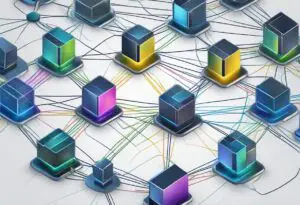Expert Analysis: The Vital Need For Cybersecurity In Today’s Connected World
Cybersecurity in the Digital Era: Why Experts Say It’s More Important Than Ever

Cybersecurity is the practice of protecting computer systems, networks, and sensitive information from unauthorized access or attacks. In today’s digital age, where almost everything is connected to the internet, cybersecurity has become more important than ever.
Cyber attacks can cause significant damage to individuals, businesses, and even entire nations. Therefore, it is crucial to understand the importance of cybersecurity and take necessary measures to protect ourselves from potential threats.
The role of cybersecurity is to safeguard sensitive data, such as personally identifiable information (PII), protected health information (PHI), personal information, intellectual property, and even governmental and industry information systems. Without proper cybersecurity measures, this information is vulnerable to theft and damage.
Cybersecurity ensures that this data is protected from unauthorized access, theft, or damage, thereby preventing significant financial and reputational losses.

Credit: www.youtube.com
Key Takeaways
- Cybersecurity is essential in today’s digital age to protect computer systems, networks, and sensitive information from unauthorized access or attacks.
- Cyber attacks can cause significant damage to individuals, businesses, and even entire nations, making it crucial to understand the importance of cybersecurity and take necessary measures to protect ourselves from potential threats.
- Cybersecurity safeguards sensitive data, such as PII, PHI, personal information, intellectual property, and even governmental and industry information systems, from theft and damage, thereby preventing significant financial and reputational losses.
The Role of Cybersecurity
Cybersecurity plays a vital role in protecting personal information and safeguarding business data. With the increasing amount of sensitive data being stored and transmitted online, it has become crucial to ensure that this data is secure and protected from cyber threats.
Protecting Personal Information
Cybersecurity is essential for protecting personal information such as social security numbers, credit card numbers, and other sensitive data. Hackers and cybercriminals can use this information to steal identities, commit fraud, and carry out other malicious activities. By implementing strong cybersecurity measures, individuals can protect their personal information from being compromised.
Some of the common cybersecurity measures used to protect personal information include:
- Two-factor authentication
- Strong passwords
- Encryption
- Antivirus software
- Firewalls
Safeguarding Business Data
In addition to protecting personal information, cybersecurity is also critical for safeguarding business data. Businesses rely on data to make informed decisions and carry out their operations. However, cyber threats such as malware, ransomware, and phishing attacks can compromise this data, leading to financial losses and reputational damage.
To safeguard business data, organizations should implement robust cybersecurity measures such as:
- Regular software updates
- Employee training on cybersecurity best practices
- Use of secure networks and firewalls
- Data encryption
- Regular data backups
By implementing these measures, businesses can protect their data and ensure that their operations are not disrupted by cyber threats.
Overall, cybersecurity plays a critical role in protecting personal information and safeguarding business data. It is essential for individuals and organizations to implement robust cybersecurity measures to protect themselves from cyber threats and ensure that their data remains secure.
The Impact of Cyber Attacks
Cyber attacks can have significant consequences for both individuals and organizations. Two of the most significant impacts of cyber attacks are financial consequences and reputational damage.
Financial Consequences
One of the most immediate impacts of a cyber attack is financial loss. Cyber criminals can steal sensitive financial information, such as credit card numbers and bank account details, and use this information to make fraudulent purchases or steal money directly from bank accounts. The financial consequences of a cyber attack can be severe, with some organizations reporting losses in the millions of dollars.
In addition to direct financial losses, cyber attacks can also result in indirect financial losses. For example, the costs associated with investigating and responding to a cyber attack can be significant. Organizations may need to hire cybersecurity experts to investigate the attack, purchase new security software, and implement new security protocols. These costs can quickly add up and have a significant impact on an organization’s bottom line.
Reputational Damage
In addition to financial consequences, cyber attacks can also result in reputational damage. When an organization is hacked, it can damage the organization’s reputation and erode customer trust. Customers may be hesitant to do business with an organization that has been hacked, particularly if sensitive customer information has been stolen.
Reputational damage can be particularly damaging for small businesses, which may not have the resources to recover from a cyber attack. In some cases, a cyber attack can even force a small business to close its doors permanently.
Overall, the financial and reputational consequences of a cyber attack can be severe. By prioritizing cybersecurity, organizations can mitigate the risk of cyber attacks and protect themselves from these consequences.
The Evolution of Cyber Threats
As technology advances, so do the methods and sophistication of cyber threats. In today’s world, cybersecurity is more critical than ever before. In this section, we will explore the evolution of cyber threats and how they have become more complex over time.
Emerging Technologies
As new technologies emerge, so do new vulnerabilities for cybercriminals to exploit. The rise of the Internet of Things (IoT) has created a vast network of interconnected devices that can be hacked. For example, a hacker could gain access to a smart home’s security system and disable it, leaving the home vulnerable to a break-in. Similarly, a hacker could gain access to a hospital’s medical devices and manipulate them, causing harm to patients.
Increasing Sophistication of Attacks
Cybercriminals are continually finding new ways to bypass security measures, making their attacks more sophisticated. For example, phishing attacks have become more advanced, with hackers using social engineering tactics to trick individuals into providing sensitive information. Malware has also become more complex, with hackers using advanced techniques such as rootkits and polymorphic malware to evade detection.
In conclusion, the evolution of cyber threats has made cybersecurity more critical than ever before. As technology continues to advance, it is essential to stay vigilant and take proactive measures to protect against cyber threats.
Cybersecurity and Compliance

Organizations must comply with cybersecurity standards and regulations to protect their data and systems from cyber attacks. Cybersecurity compliance is a significant challenge for organizations because industry standards and requirements can overlap, leading to confusion and more work. Compliance involves implementing strong security protocols, complex encryption methods, and proactive countermeasures.
Regulatory Requirements
Regulatory requirements are essential rules set by bodies like the FTC, NIST, and GDPR that organizations must follow to maintain cybersecurity standards. These regulations provide a framework to ensure data and systems are secure. Compliance is crucial to avoid fines and legal repercussions, as seen with the significant penalties imposed by GDPR for non-compliance. Organizations must implement appropriate measures to protect personal data effectively.
Legal Consequences
Organizations that neglect cybersecurity regulations risk severe legal consequences, including fines and penalties imposed by bodies like the FTC. To avoid these repercussions, they must implement robust security measures and train employees on cybersecurity best practices. Compliance is vital not only for legal protection but also for safeguarding data and systems from cyber attacks. Ultimately, prioritizing cybersecurity compliance is essential for ensuring organizational security.
The Future of Cybersecurity

As technology advances, so do the threats to cybersecurity. It is important to understand the future of cybersecurity to stay ahead of potential risks and threats. This section will cover some of the advancements in cybersecurity and the challenges ahead.
Advancements in Cybersecurity
Advancements in cybersecurity are continuously being made to keep up with the evolving threat landscape. Some of the advancements include:
- Artificial Intelligence (AI) and Machine Learning (ML): AI and ML are being used to detect and prevent cyber attacks in real-time. They can analyze large amounts of data and identify patterns that may indicate a potential threat.
- Blockchain Technology: Blockchain technology is being used to create secure and decentralized systems that are resistant to cyber attacks. It is being used to secure financial transactions, supply chains, and more.
- Cloud Security: Cloud security is becoming more advanced, with features such as encryption, access controls, and threat detection. Cloud providers are also offering more security services to their customers.
Challenges Ahead
Despite these advancements, there are still challenges ahead in the world of cybersecurity. Some of the challenges include:
- Cybersecurity Skills Gap: There is a shortage of cybersecurity professionals, and this gap is expected to grow in the coming years. This makes it difficult for organizations to find and retain qualified cybersecurity personnel.
- IoT Security: The Internet of Things (IoT) is growing rapidly, and with it comes new security risks. Many IoT devices are not designed with security in mind, making them vulnerable to cyber attacks.
- Ransomware and Other Malware: Ransomware attacks are becoming more sophisticated, and other types of malware are also evolving. This makes it difficult for organizations to detect and prevent these types of attacks.
In conclusion, the future of cybersecurity is both promising and challenging. Advancements in technology are being made to improve cybersecurity, but there are still gaps that need to be addressed. It is important for organizations to stay informed about the latest trends and threats in cybersecurity to protect themselves and their customers.
Frequently Asked Questions
What are the main types of cyber threats?
There are various types of cyber threats, including malware, phishing, ransomware, denial-of-service (DoS) attacks, and man-in-the-middle (MitM) attacks. Malware is malicious software that can damage or steal data from a computer system.
Phishing is a type of cyber attack that uses fraudulent emails or messages to trick individuals into revealing sensitive information. Ransomware is a type of malware that encrypts a user’s data and demands payment in exchange for the decryption key. DoS attacks aim to disrupt the availability of a website or service, while MitM attacks intercept and modify communications between two parties.
What are the benefits of having strong cyber security features?
Having strong cyber security features can help protect against cyber threats, which can result in financial loss, data breaches, and reputation damage. Cyber security features can help prevent unauthorized access to sensitive data and systems, detect and respond to cyber attacks, and ensure compliance with regulations and standards.
What are the three goals of cyber security?
The three goals of cyber security are confidentiality, integrity, and availability. Confidentiality means that data is protected from unauthorized access. Integrity means that data is accurate and has not been tampered with. Availability means that data and systems are accessible and usable when needed.
Why is cyber security critical for modern society?
Cyber security is critical for modern society because of the increasing reliance on technology and the internet. Cyber attacks can cause significant disruptions to essential services, such as healthcare, finance, and transportation. Cyber security is also essential for protecting personal information, such as financial and medical records, from theft or misuse.
What are some examples of cyber security breaches?
There have been numerous high-profile cyber security breaches in recent years, including the Equifax data breach, the WannaCry ransomware attack, and the Target data breach. These breaches resulted in the theft of sensitive information, including social security numbers, credit card information, and personal data.
Why is cyber security more important now than ever before?
Cyber security is more important now than ever before due to the increasing use of technology and the internet, as well as the growing sophistication of cyber threats. With more people working remotely and conducting business online, the risk of cyber attacks has increased significantly. As a result, organizations must prioritize cyber security to protect against potential threats and ensure the safety of their data and systems.

I am a technology Specialized writer and blogger based in the USA & UK. I have four years of experience in Cyber Security, Technology, Social Media and all types of electronic devices like computer laptops etc. So I work on solving these issues and give various tips on these issues



